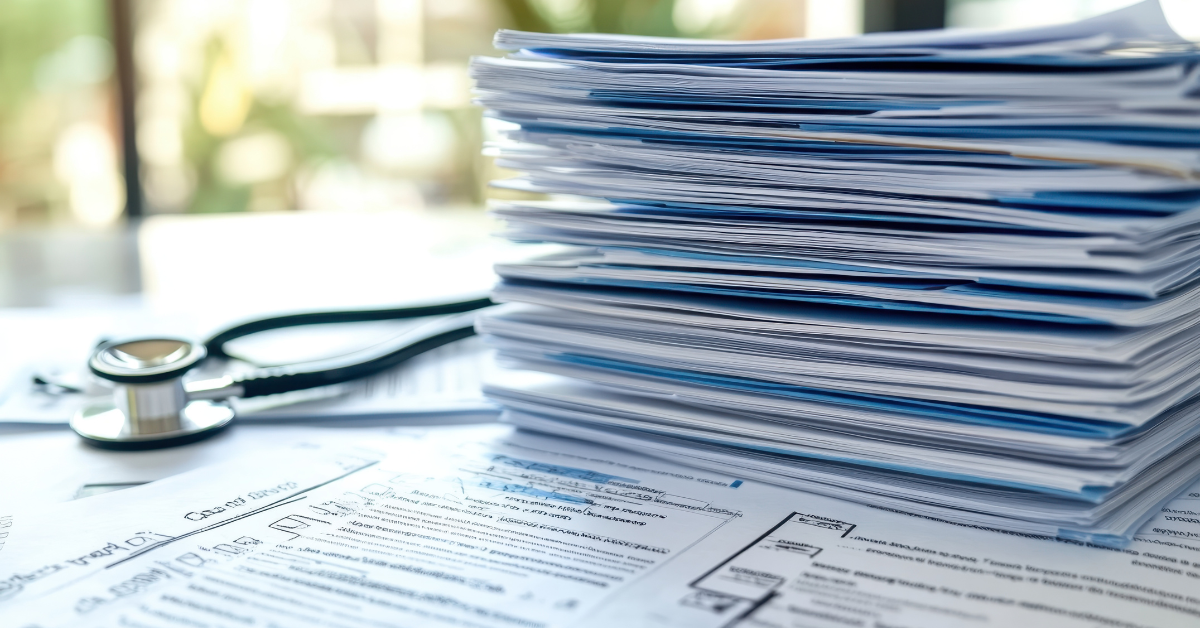

The Role of Medical Documentation in Auto Injury Claims
When you're involved in an auto accident, the moments afterward can be both confusing and stressful. This can drastically change depending on the gravity of the accident and the injuries sustained. In addition, victims of auto accidents have to deal with insurance companies, medical expenses and vehicle repairs. Some accidents can also result in the complete loss of a vehicle. However, one of the most critical aspects of your recovery and legal case is your medical documentation. Medical documentation is the foundation to your claim and legal proceedings. Accurate medical records can better establish the link between your accident and your injuries. Therefore, it is important to seek medical help as soon as possible, even if you feel fine at first. Whether you're pursuing compensation for injuries or defending against a claim, comprehensive medical records can be the difference between success and failure.
Why Medical Documentation Matters
Medical documentation serves as the foundation of any auto injury claim. Insurance adjusters, lawyers, and even juries rely on these records to evaluate the extent of an injury and determine fair compensation. The lack of accurate medical documentation can make it difficult to prove that an injury occurred. It can also put in doubt whether the injury was caused by the accident, and what impact it has on the victim's life. Here’s how medical documentation can strengthen a person’s case.
Key Roles of Medical Documentation in a Claim:
- Establishing a Timeline
Medical records help create a clear timeline that links the accident to the injury. However, not seeking medical help immediately can weaken your claim. Insurers can argue that the injury wasn't serious or wasn’t caused by the accident. - Demonstrating Severity
The more detailed your medical records, the better it can convey the severity of the injury. Additionally, Detailed records can show the required treatments for recovery, and any long-term effects the injury may have on you. Medical documentation can also impact the amount of compensation awarded for pain and suffering, lost wages, and medical expenses. - Supporting Credibility
Consistency between your account of the injury and the medical records strengthens credibility. Be as honest as possible with medical professionals when you describe your symptoms. If there are any inconsistencies or gaps in your account, it can raise red flags for insurers and defense attorneys. - Documenting Treatments and Costs
Keeping documented records such as hospital visits, physical therapy, surgeries, medications, and rehabilitation is crucial when calculating the compensation awarded. Always ask for a copy of these records at the end of each visit. - Linking Injuries to the Accident
Your physician will make notes that connect your injuries directly to the auto accident. This is vital for your claim and compensation. If there isn’t a clear link between the accident and your injuries, insurance companies can make the argument that the injury was pre-existing or unrelated.
In conclusion, thorough and timely medical documentation is essential to building a strong auto injury claim. It not only validates the extent and cause of your injuries but also supports your credibility and helps secure fair compensation. By prioritizing accurate records and consistent communication with healthcare providers, you protect both your health and your legal rights.

What To Include in Your Medical Documentation?
As we’ve established, medical documentation is important for your legal rights and securing a fair compensation as they help show the true scope of your injuries and the impact they’ve had on your life. Here is a list of what to include in your documentation:
- Emergency room report: documents the immediate response to your injuries and initial diagnosis
- Doctor's notes and diagnoses: provides a look of the ongoing assessments and outline s the nature of your injuries
- X-rays, MRIs, and other imaging: Offers a visual of the damage you suffered not seen by the naked eye
- Prescription records: Shows the medications you have been prescribed and the severity of your symptoms.
- Physical therapy notes: Include the steps taken towards recovery while also documenting any physical limitations you may be suffering.
- Prognosis reports: Can establish if your injuries will have long-term or permanent consequences on your life.
- Medical bills and cost estimates: necessary to determine the financial impact of your injuries.
Bear in mind this is not an exhaustive list. Documentation requirements can vary patient to patient depending on the severity of the injuries. It’s important for patients to be thorough and honest with their healthcare providers. Mention all symptoms, even minor ones, as they could develop into more serious issues over time.
Tips for Strengthening Your Auto Injury Claim
- Seek Immediate Medical Attention: Even if injuries seem minor, a prompt evaluation documents your condition while it's fresh.
- Follow Treatment Plans: Failing to follow prescribed treatments can undermine your claim.
- Keep a Medical Diary: Record symptoms, pain levels, and how the injury affects your daily life.
- Work with Professionals: Medical and legal professionals can coordinate to ensure that your documentation supports your claim effectively.
Common Mistakes to Avoid with Medical Documentation
Even with the best intentions, some victims of auto accidents can inadvertently weaken their claims by mishandling medical documentation. Understanding these pitfalls can help you avoid setbacks in both your recovery and the legal process. The most common one is delaying medical care. If you delay getting medical care or do not seek medical attention at all, insurers can use this to question the seriousness or cause of your injuries. If your injuries cannot be linked to your accident, you can either lose your compensation or have it significantly reduced. Inadequate communication with healthcare providers is another issue. Underreporting your symptoms or pain can result in incomplete records that fail to reflect the true extent of your condition. Always be as detailed as possible when describing your symptoms; this will help paint a better picture of the extent of your injuries. Additionally, missing follow-up appointments or disregarding medical advice can be seen as a lack of commitment to recovery, which can damage your credibility. Additionally, not keeping personal copies of your medical records can lead to missing or delayed information when it’s most needed. Don’t just rely on insurers and providers, always keep copies of your records. Car accident victims often overlook the mental and emotional impact of an accident. Car accidents can lead to anxiety, depression, or PTSD, which should be documented and addressed by mental health experts. Avoiding these missteps and correctly managing your care and documentation will ensure both your physical recovery and the amount you are awarded for damages.

How Medical Professionals Can Support Your Case
Medical professionals play a critical role beyond diagnosis and treatment. Doctors and specialists can provide detailed medical reports that outline the nature, extent, and likely cause of your injuries; this can carry considerable weight in court or insurance negotiations. Doctors and specialists can also testify on your behalf, offering professional interpretations of test results and explaining how your injuries relate to the accident. They can also assess the long-term impacts of your injuries by forecasting future complications or the need for continued care. This can help you get a fairer compensation. They also play a key role in documenting pain and suffering by recording symptoms like chronic pain, reduced mobility, or emotional distress. Furthermore, doctors can also coordinate with legal teams to ensure that documentation is both medically accurate and legally sound. This is why it is important to build a relationship with your healthcare provider that goes past the treatment office. Your injuries will be fully documented and your legal rights protected. Always be proactive, ask questions, share all symptoms, and confirm that your medical records reflect your true condition and progress.
Final Thoughts
Medical documentation is not just a formality—it’s a vital component of any auto injury claim. Whether you're seeking compensation or navigating the insurance process, the quality and completeness of your medical records can make or break the outcome of your case. As you can see, these records are the primary evidence of your injuries, treatment and recovery timeline, which can affect the compensation you receive. Not keeping this documentation can make it harder to establish a link between your injuries and the accident, which can lead to your compensation being reduced or you not receiving any compensation at all. If you’ve been injured in an accident, prioritize both your health and your legal rights. Consult a medical professional immediately after the accident and speak to an attorney to guide you through the documentation process and help build a strong case. The earlier you take these steps, the better the outcome will be.
Visit Us Today – North Florida Medical Center
At North Florida Medical Center, your health and recovery are our top priorities. Whether you've been injured in an auto accident or need routine medical care, our dedicated team of healthcare professionals is here to provide compassionate, comprehensive treatment tailored to your needs. From urgent care and diagnostic imaging to physical therapy and long-term recovery plans, we offer a full range of services under one roof. Every patient is different, which is why we will work closely with you to properly assess your injuries and develop a comprehensive treatment plan. Additionally, we will support you outside of our offices, by keeping detailed medical records for your claims and compensation. Conveniently located in Jacksonville, Fl, and committed to patient-centered care, we make it easy to get the help you need. Walk-ins are welcome, and same-day appointments are often available. Don’t wait! take control of your health and visit North Florida Medical Center today. Let us support you on your path to recovery.